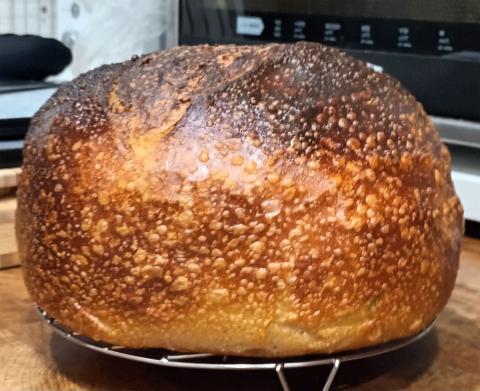
Over proofing explored

Experimenting with over proofing.
By deliberately over proofing, I have found that I can get a superlight, uniform crumb that is soft and delicious, with a crisp crust.
I am still experimenting with this. with my regular sourdough I make a 750g-800g batch which would normally give me 2 x 800g ish loaves. I baked the first loaf in my large stainless steel stewpot with a glass lid. It went wild and totally filled my pot.
so today I further divided the second half of the same batch between 2 small loaf tins. This gave me the crusty beauts depicted.
My plan is to mix a slightly larger batch size, and divide it into 3, instead of 2 so that the loaf in the pot will be smaller and hopefully give me two larger tin loaves.
Comments and ideas are welcome.
Recipe: 550g water 200g starter 150g WW flour 650g Blue Jacket bread flour 20g salt.



Right now however long I proof for the oven spring is still wild. Even if I allow the final proof to double or more (which would be called over proofing) it still has runaway oven spring. All started with my new starter.
Great looks!
I've done some "over"-proofing too. I don't exactly go by doubling, but well past when the poke test would show it's proofed. How well it works out depends on the flour(s) as well as the starter. I've had some amazingly fine large airy loaves, but some relative failures too. Mine were all free-standing, and I think that proofing and baking in a container would make long proofing easier, since if the loaf wants to slump it's contained.
Thanks for the comment. I think the main thing in my case is the baking vessel. If I over proofed hen tried to shape I ended up with a gooey mess, but letting it proof and sit in the pot undisturbed it keeps its shape and tension. Only thing I do before baking is score. The Stainless steel pot means I dont have to preheat for an hour. I just turn on my oven 5 mins before baking, while I score the loaf.
OP-Loaf-3-with-pot.jpg
By overproofing , do you mean during bulk fermentation, or during the final proof?
LL
I meant during proofing of the shaped loaf.
Ahhh. Ok so you're not cold retarding it. Just final proofing at room temperature. Sorry I've been doing this for about 3 years but still feel like I'm new at it.
I mean after the bulk ferment and shaping. I leave 1/3 of the dough at room temp. The rest I retard in the fridge until I want to bake it, could be 4, or 5 days. Then I shape it and leave in in my SS Pot over night at room temp, about 12 hours.
We here at the AZ. Sourdough Foundation approve of your exercise, and methodical methodology. Kudos.
My last loaves were delicious and would have been deemed over proof by the usual standards. Fact is, it is hard to spoil a dough with over proof so that it makes bad bread. Different bread, yes, but bad bread, one has to over proof by a long shot. There is ample margin of "error" (or improvement) by over proofing the dough. There probably is some "catastrophe theory" at play here: the bread improves and improves, until suddenly it's a disaster. But yeah, basically I don't fear excess fermentation any more. If the recipe and the kneading are OK, it's hard to spoil the work with over proofing.
Bread is a 6 thousand-year-old technology, and sometimes we make it appear harder than what it is. Over proofing is an overrated concept.